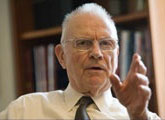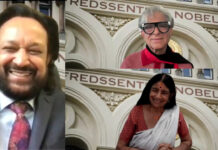 I’ve seen a lot over my decadesin politics, and not muchalarms me. But I have to be blunt: Money is poisoning our political system.
I’ve seen a lot over my decadesin politics, and not muchalarms me. But I have to be blunt: Money is poisoning our political system.
The people who matter most to a representative democracy – the ordinary voters in whose interests elected politicians are supposed to act – feel they’ve become an afterthought in the political process. The tidal wave of money washing over our elections, with no end in sight, is causing Americans to lose faith in the system.
Oddly, many politicians see no problem. They don’t believe that they’re selling their votes, or even that money influences their behavior.
While it is a rare member of Congress who would change his or her vote because of money, there is ample evidence that when donors contribute heavily, they have a disproportionate influence over the legislator; that’s not “corruption,” but it means that the opinions of average citizens are diminished when it comes to policy-making.
Thanks to a series of Supreme Court decisions over the last half-decade, we’ve seen a surge in campaign spending that is beyond the ability of journalists and regulators to track. This money purchases attack ads that saturate the airwaves with scant clue as to who is funding them. And it pushes our politics toward the extremes, emphasizing ideological purity, unremitting partisanship, and a political culture that exalts confrontation over consensus-building. In other words, it cripples representative democracy.
So what can we do? The first priority is to find ways of boosting prompt financial disclosure – to trace the source of campaign spending on behalf of candidates and incumbents before an election so that voters know who is supporting whom, and can match candidates’ positions on issues with the interests of their financial backers. Disclosure done after elections is meaningless.
The second major reform is to make public funds available for financing campaigns, thus amplifying the contributions of ordinary Americans, freeing candidates to spend more time on substance rather than fundraising, and letting them engage more fully with voters rather than donors.
The odds of action are not encouraging. Yet I’m heartened by something Republican Sen. Lindsey Graham told reporters in New Hampshire the other day. “You’re going to have money dumped in this election cycle that’s going to turn off the American people,” he said. “There’s going to be a need and a movement to try to control the money in politics.” Let’s hope he’s right.
Lee Hamilton is Director of the Center on Congress at Indiana University; He was a member of the U.S. House of Representatives for 34 years.
Lee H. Hamilton






